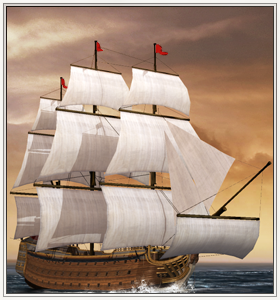Difference between revisions of "Second Rate Ship of the Line (ETW Unit)"
(→Overview) |
Gen. Chris (talk | contribs) |
||
| Line 1: | Line 1: | ||
| − | {{Unit|image=[[Image:2nd Rate.png]]|Class= | + | {{TW Unit|image=[[Image:2nd Rate.png]] |
| − | + | |Class=Second Rate | |
| + | |Unit Size=224 | ||
| + | |Weaponry=84 guns | ||
| + | |Region=Global | ||
| + | |Recruitment Cost=2720 | ||
| + | |Upkeep Cost=680 | ||
| + | |Building Requirements=Steam Drydock | ||
| + | |Tech Requirements=None | ||
| + | |Attributes=Broadside | ||
| + | }} | ||
==Game Description== | ==Game Description== | ||
| Line 12: | Line 21: | ||
==Overview== | ==Overview== | ||
| − | Second rates are the first triple-deck warship and has poor sailing capabilities; however, its firepower and manpower easily exceed all of the ships | + | Second rates are the first triple-deck warship and has poor sailing capabilities; however, its firepower and manpower easily exceed all of the ships preceding it. Second rates can be expected to fight almost any ship type with equal or superior footing. They can even go toe-to-toe with first rates, since they are barely inferior to those behemoths. Second rates can, however, be quite easily out-maneuvered by fourth and fifth rates. |
| + | |||
| + | == Details == | ||
| + | |||
| + | Relatively inexpensive compared to the first rate, the second rate is a suitable replacement if costs are a consideration. Its firepower, manpower, and durability are more than suitable to the task when lacking a first rate. | ||
== Factions == | == Factions == | ||
Revision as of 21:50, 14 January 2013
Contents
Game Description
This three-deck warship is a compromise design between the firepower of a first rate ship and the sea-keeping qualities of a third-rate 74. Like many compromises, the result is something that pleases few, but the extra weight of the broadside does compensate for poor sailing qualities. The design does have one unexpected benefit: enemy captains are often quick to identify second rates as much larger ships and, as a result, flee from a “much superior” enemy!
The lower gun deck houses 32-pounders, and this explains the “tumblehome” shape of all ships of the period: the bulge at water level and just above in the hull allowed more room on the lower decks for the recoil of large cannons; the lighter guns on the higher decks did not recoil as much.
Historically, only the British Royal Navy commissioned many ships of this rating; other nations simply built first rates instead. This might be due to the Royal Navy needing to keep large ships on foreign stations as flagships, an assignment that would have been wasteful and expensive for a first rate.
Overview
Second rates are the first triple-deck warship and has poor sailing capabilities; however, its firepower and manpower easily exceed all of the ships preceding it. Second rates can be expected to fight almost any ship type with equal or superior footing. They can even go toe-to-toe with first rates, since they are barely inferior to those behemoths. Second rates can, however, be quite easily out-maneuvered by fourth and fifth rates.
Details
Relatively inexpensive compared to the first rate, the second rate is a suitable replacement if costs are a consideration. Its firepower, manpower, and durability are more than suitable to the task when lacking a first rate.
